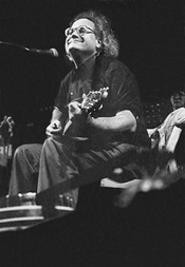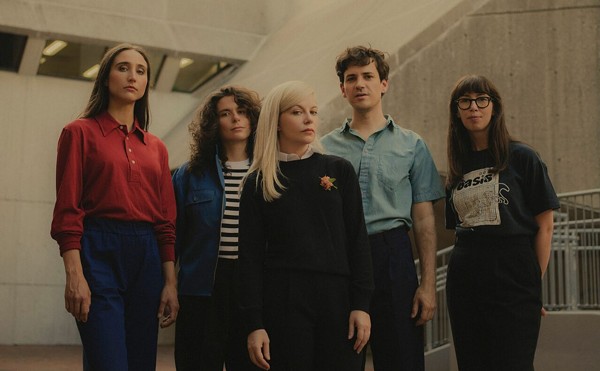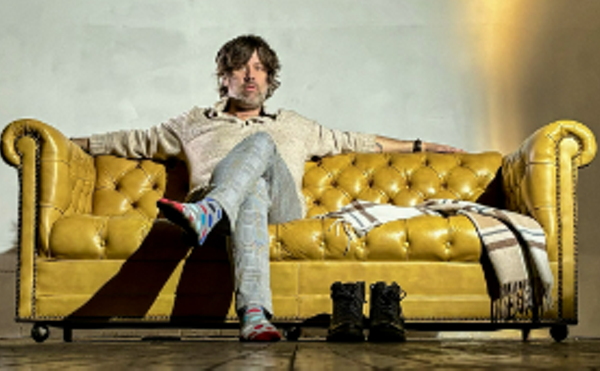"Not very musical . . . This is supposed to be an acoustic guitar CD, but there is precious little music on it. Each cut may have a note or two, no more. Save your money!"
#151; Customer comments about Eugene Chadbourne's recording Solo Acoustic Guitar, Vol. 2, posted on Amazon.com.
Granted, the album is difficult to enjoy. At one point, Chadbourne sounds as if he's been spending several minutes fudging around with the microphone; at another, he seems to be madly plucking random strings, like a rabid John Cage with a newfound interest in folk. But to call Chadbourne "not very musical," well, that's a point of contention. In fact, Chadbourne, a guitarist and singer, player of the "communist" banjo and amplified rake, lives on a rarefied plane where all genres are equal — that is, equally deserving of the Chadbourne treatment. Roughshod, he runs them over like teen drivers through hedgegroves and flowerbeds. It would probably be more appropriate to call him too musical.
Take as primer the second track from the aforementioned solo guitar album. Chadbourne covers "Rocket (to Roscoe Mitchell)," a tune by the avant-garde saxophonist Oliver Lake. As Chadbourne hurls notes from all directions, you can't help but notice the sounds of a blues slide guitar creeping into the track. Conversely, on the album Pachuco Cadaver (a down-home reworking of the Beefheart/Zappa songbook with Mothers of Invention drummer Jimmy Carl Black), Chadbourne takes a country and blues sound and at times pushes it to free-form abstraction. For Chadbourne, the musical egalitarian, there are no boundaries and no need to specialize, and for Chadbourne, the musical anarchist, any genre is just as capable, tractable, and exploitable as any other when it comes to creating confusion.
"I think it was exposure to a lot of different types of music," says Chadbourne, trying to explain how he came to be him. "There was a very good underground radio station in the town I grew up in, Boulder, Colorado, that was playing an incredible mixture of things all day long and linking things together, so the young kids just getting into music would hear how things related. You'd hear Jethro Tull, but then you'd hear Roland Kirk, and then you'd hear Bach flute music. So inside of fifteen minutes, the [DJ] turns you on to the flute. "This guy playing flute in a rock band is not the only flute player in the world. Here's the guy he's imitating.' They didn't make a big deal about it, but I learned a lot and got into lots of different types of music. Basically, I formed the opinion that, if I liked something, it was good. I didn't really care if it was popular or not. And then I started noticing that the more popular things were, often the worse they were."
Young Chadbourne still had a few years to go before he became a musician. After high school, he moved out to Canada, working as a copy runner for The Calgary Herald. Hoping to get himself promoted to reporter while at the same time fending off the onslaught of not-so-competent journalism school grads, Chadbourne found his edge: He could review rock.
"I got famous in the town really fast, because I hated the rock music in the '70s, and I was always telling people to listen to Coltrane. I got a lot of angry letters, and [the paper] loved it. Whenever I got an angry letter, I got a raise."
When he returned to the States, Chadbourne and his guitar popped up in New York just in time to hook up with heterodox composer and musical iconoclast John Zorn, among other musicians, forming the first of many wild collaborations Chadbourne would have over the years. (Chadbourne has recorded with musicians as disparate as abstract, free guitarist Derek Bailey and members of the Violent Femmes). And even if Chadbourne left it at this — unpredictable, bulldozer music for guitar that ranges all over the stylistic map — it would still be problematic for most listeners. However, he of the mighty musical appetite, Chadbourne found room for another seemingly incongruous influence: the protest folk of Phil Ochs.
"Not every project has the political. The reason I do that stuff was seeing Phil Ochs when I was a kid. I was very upset with what was going on in the world, and seeing him was kind of a relief, in a sort of humorous sort of way . . . Sometimes it was humorous, and sometimes it was a sort of lyricism. I used to imitate him and mess around. Later I got interested in coming up with humorous political material as a songwriter. It's a challenge to write about topical stuff and then come up with something that someone could play fifteen years later, and it still relates to what's going on. Basically, you're always dealing with the same things — racism, war, poverty — but sometimes you can actually talk about totally topical stuff."
And so with Chadbourne, you not only get country-and-western-free jazz at any moment, you might also, within the bounds of the same song, get uproarious political commentary. Not exactly mainstream stuff, this. But Chadbourne remains unswervingly confident.
"There's an audience out there for anything that you do," he says, and you just about believe him. But as willfully broad and nebulous as his music and musical interests can be, Chadbourne does at least suggest a grand unification theory of sorts; he digs music that has the power to irritate.
"Punk was great. Not all of it was sophisticated politically — some of the stuff was just "fuck off' lyrics — but the sound of the music was so aggressive, you would see people make faces and say, "Oh my God, what's that?' I love music like that. I didn't really like rap music until I was on a bus in San Francisco with my father, and a dude got on with a blaster with rap going. I saw my father's face, and he was practically getting sick. If I see that a new kind of music is irritating to people, then I reinvestigate it. It's not that easy for music to be irritating."
So, does Chadbourne have any plans to incorporate rap into his music? Not really. The man has other things on his wicked mind. Says Chadbourne, "I've been doing more Broadway show tunes."












